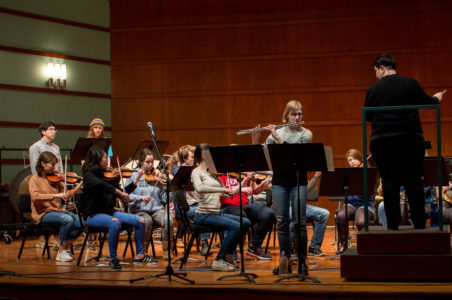By Ben Mikek
mikekben@grinnell.edu
On March 10, the Grinnell Symphony Orchestra, directed by Visiting Director of Orchestras Jaemi Loeb will perform its first concert of the spring semester. Loeb, who is leading the orchestra during the 2017-2018 academic year while regular director Professor Eric McIntyre is on sabbatical, will direct three pieces. Each piece has distinct musical, emotional and historical differences from the other two pieces.
The concert will begin with Charles Griffes’ “Poem,” featuring a flute solo by Kirsten Gillis ’18, who won the annual concerto competition to place this composition on the program.
“I’ve been playing this piece for over a year now,” Gillis said. “The orchestra has three or four months to learn it and play it, and that can be hard because [the] orchestra has so much less time.”
“Poem” communicates varying emotions.
“[‘Poem’] definitely does have this somber feel to it, but there’s also really fun and uplifting parts of it,” Gillis said. “The beginning is very pensive — I feel like it’s thinking about what’s going to happen — and then all of a sudden you get hit with this fast stuff and it gets really fun.”
“Poem” will be followed on stage by an innovative modern composition, Richard Ford’s “Bolts of Melody.” This piece crosses the boundaries of art forms, musically referencing the poetry of Emily Dickinson. Loeb, who knows the composer who conducted the world premiere of the piece in 2011, has directed “Bolts of Melody” before. The piece contains “quotations from [Emily Dickinson’s] poems, and some sort of exploration of … the concept of finishing a work—what does it mean to be finished?” Loeb said. “That’s a thing that poets, writers, composers, painters, all kinds of artists really struggle with. To me that’s really fascinating because as a performer, that’s not so much an issue; its finished when you walk out on stage and do it.”
After this reflection on completion, the orchestra will close the concert with Prokofiev’s “Lieutenant Kijé,” originally composed as a film score in 1934.
“It’s kind of like celebration music. It kind of sounds as if we were playing for some kind of wedding,” said Mayu Sakae ’20, a violinist. The piece, which maintains notes of humor from its cinematic origins, has deep historic roots.
“‘Lieutenant Kijé’ … from this standpoint sounds very Russian. In [Prokofiev’s] day, there were some naysayers about how Russian his music was,” Loeb said. “He had fled the Soviet Union, and in doing this movie score, he had high hopes of getting into everyone’s good graces.”
The concert, then, will attempt to unite three pieces from very different times and styles. Regardless, members noted teamwork helped the concert become reality.
“It’s really a group effort. … When everyone does it together, it’s just really awesome,” said Marie Spychala ’18, who plays the flute.
The concert will begin at 3 p.m. on Saturday, March 10. According to Sakae, there should be one simple takeaway.
“[The audience should leave feeling] encouraged or happy,” she said. “I guess it comes back to the positive attitude.”





























































